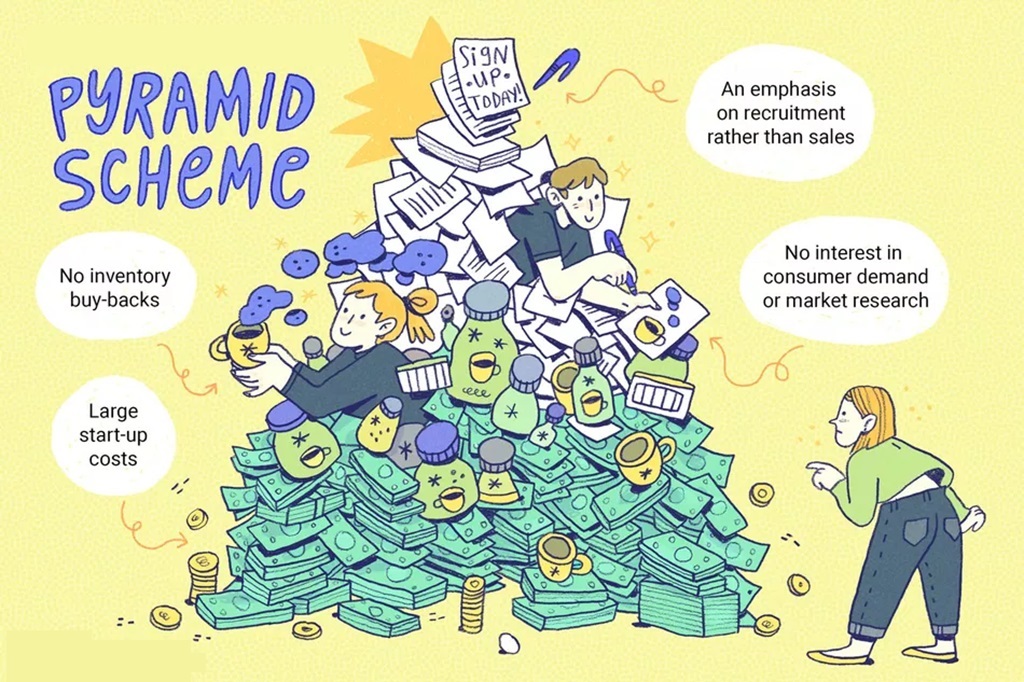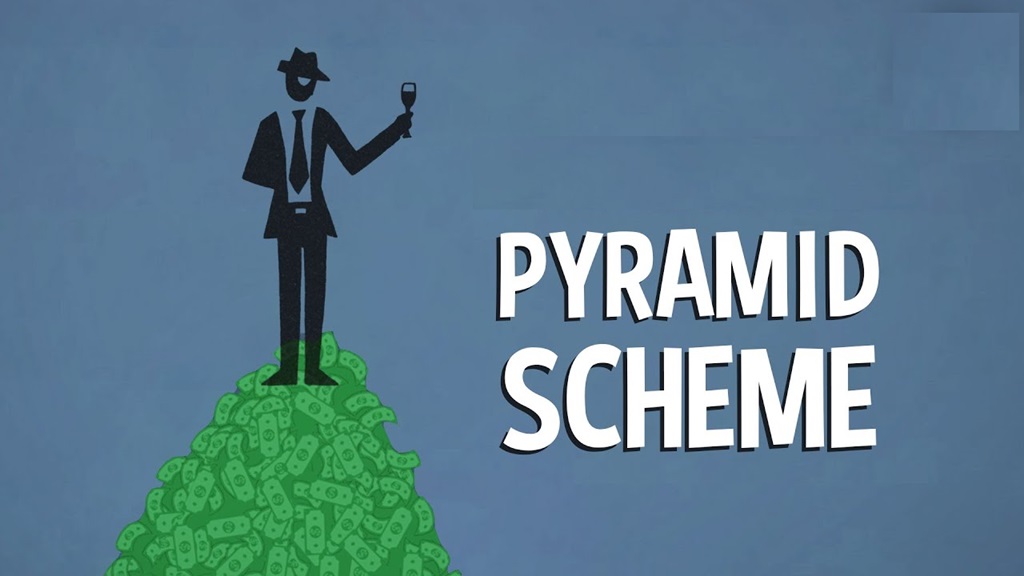
09 Jan How to Identify a Pyramid Scheme?
A pyramid scheme is an illegal and unsustainable business model that lures participants by promising them payment or services primarily for enrolling other people into the scheme, rather than supplying any real investment or sale of products or services to the public. Pyramid schemes are designed to collapse when recruiters can no longer sustain the pyramid’s exponentially increasing bottom tier. The vast majority of participants lose money in these schemes.
Pyramid schemes often disguise themselves as legitimate multi-level marketing companies. However, there are key differences between illegal pyramid schemes and legal multi-level marketing structures. Here’s what you need to know to identify and avoid getting caught up in pyramid schemes.
What is a Pyramid Scheme?

A pyramid scheme is a fraudulent system of making money that requires people to recruit new members, who pay upfront costs up the chain, rather than relying on the sale of real products or services to generate revenue. Pyramid schemes focus on signing up more and more new recruits so that those at the top levels can get paid.
The structure looks like a pyramid with a few people at the top and increasing numbers of people making up each level below. New recruits pay money upfront to join. That money flows up through the pyramid structure. As you go up the pyramid there are fewer and fewer people who share the money from an expanding base of recruits.
Pyramid schemes typically appeal to new recruits by promising them large potential returns for getting in on the ground floor. But the underlying business model is unsustainable. The ever-expanding number of recruits required to generate payouts for those at the top of the pyramid inevitably collapses when the pool of potential new members dries up.
Most people who get involved with pyramid schemes end up losing money rather than making it because the structure inevitably collapses and leaves the majority at the bottom with no way to recoup their initial “investments.”
Key Features of Pyramid Schemes
Pyramid schemes often disguise themselves as legal multi-level marketing structures but have some key characteristics that differentiate them:
- Primary focus on recruiting over selling products: The bulk of any commissions or bonuses paid out come from recruiting new distributors rather than actual sales of products or services to genuine customers.
- Large initial buy-in: New recruits are required to pay high upfront costs to join and get products or services to attempt to resell, primarily as a way to fund payments up the pyramid.
- Complex commission structure: The payout scheme has multiple layers of distributors getting paid for enrolling other people rather than direct sales.
- Overpriced products: Any products tied to the scheme tend to be overpriced compared to similar products available elsewhere.
- No real customers: Pyramid schemes lack genuine retail customers outside of members in the structure itself. Most products purchased are by recruits attempting to progress up the pyramid.
- Saturated market: The pool of potential new recruits inevitably dries up as markets become saturated, dooming the pyramid structure.
- Income relies on continuous recruiting: The incentive to make money depends almost solely on building a downline by recruiting more members rather than earning commissions from direct sales.
Pyramid Scheme Red Flags
There are many red flags that may indicate a business opportunity is really an illegal pyramid scheme:
- You have to pay a large upfront buy-in fee of hundreds or thousands of dollars to participate
- The focus is on recruiting “your team” or “downline” members rather than selling products
- You’re encouraged or required to purchase large amounts of products upfront
- The company produces little or nothing of real value
- The products are revealed to be low quality or completely worthless
- Prices are higher than similar products from other companies
- You must recruit new members to advance up the hierarchy
For instance, if you’re wondering about a specific company, like Blue Raven Solar, make sure to investigate thoroughly. Discover is blue raven solar a pyramid scheme or a legitimate opportunity by examining reviews, conducting due diligence, and seeking advice from reliable sources. This way, you can protect yourself from potential scams and make informed decisions about your financial ventures.
Multi-Level Marketing vs Pyramid Schemes
Multi-level marketing (MLM) is a legal and legitimate business structure. However, many pyramid schemes disguise themselves as MLM companies. Here are some of the key differences:
- Products: MLMs focus on selling actual products or services to genuine retail customers. Pyramid schemes focus on getting buy-ins from recruits and have little focus on products.
- Recruiting: MLMs encourage but don’t require recruiting. Pyramid schemes depend on unlimited, continuous recruitment.
- Earnings: MLMs allow income from both direct sales and recruiting. Pyramid schemes only reward you for recruiting others.
- Company longevity: MLMs involve sustainable long-term business models. Pyramid schemes inevitably collapse.
- Buy-in: MLMs may charge small buy-ins for sales tools/training. Pyramid schemes charge large upfront buy-ins.
- Transparency: MLMs are forthright about their structure. Pyramid schemes use complex structures to hide their unsustainability.
No legitimate MLM will be focused primarily on recruitment over product sales. Research any MLM thoroughly before joining to ensure the compensation structure is tied to real product sales rather than endless recruiting.
Are Pyramid Schemes Illegal?
Yes, pyramid schemes are illegal scams in the United States, Canada, and many other countries because they are inherently fraudulent and unsustainable.
All pyramid schemes eventually collapse, leaving the majority of participants who bought in at the bottom levels with losses. For this reason, government regulators like the U.S. Federal Trade Commission (FTC) and Securities and Exchange Commission (SEC) work to take legal action to shut pyramid schemes down.
The Federal Trade Commission Act bans “unfair or deceptive acts or practices” like pyramid schemes to protect consumers. Section 5(a) of the Federal Trade Commission Act states: “Unfair methods of competition in or affecting commerce, and unfair or deceptive acts or practices in or affecting commerce, are hereby declared unlawful.”
Participating in illegal pyramid schemes can lead to civil and criminal prosecution. Penalties may include fines, asset seizures, and even jail time for owners and top promoters of pyramid schemes who knowingly deceived and defrauded consumers.
Warning Signs of a Pyramid Scheme
Here are some key warning signs that a business model may actually be an illegal pyramid scheme:
- Too good to be true claims – Promises of making huge amounts of easy money very quickly.
- Focus on recruiting – Pressuring new recruits to focus on signing up their friends and family.
- Upfront buy-in fees – Requiring large upfront payments to join and buy products or services to resell.
- Complex commission structure – Pay outs rely on continuously recruiting new members rather than direct retail sales.
- Saturated market – An expanding geographic region rapidly becomes oversaturated with distributors.
- Low-quality products – The products are revealed to be low quality, overpriced, or completely worthless.
- No customers – Lack of retail customers outside of pyramid scheme members.
- Recruitment requirements – You must recruit new members to progress up the pyramid chain.
- Quitting loses your money – You can’t get back your initial investment if you quit the scheme.
- No tangible product or service – Nothing of real value is actually being sold to genuine customers.
Protecting Yourself from Pyramid Schemes

Here are some tips to avoid losing money in an illegal pyramid scheme:
- Research thoroughly – Investigate any multi-level marketing or direct sales company extensively before joining.
- Beware easy money claims – Be skeptical of any claims about getting rich quick without effort.
- Watch for recruitment focus – Make sure the business focuses primarily on selling products or services rather than recruitment.
- Consider buy-in costs – Avoid companies that require large upfront buy-ins and inventory purchases.
- Read income disclosures – Check income statements to see if most income comes from recruitment.
- Evaluate products critically – Determine if products offer good value or are overpriced.
- Ask about customers – Ask for documentation that real customers outside the business exist.
- Don’t pay to work – Never take a “job” that requires you to invest rather than earn money.
- Trust your gut – Walk away if you have doubts or it seems too good to be true.
FAQs
Q: How can I tell if a multi-level marketing company is a pyramid scheme?
A: Focus on whether retail sales to genuine customers outside the MLM distribution chain make up most revenue, not recruitment. Legitimate MLMs focus on product sales and have sustainable compensation structures.
Q: What are some specific pyramid schemes I should avoid?
A: Some well-known pyramid schemes that have been shut down include Herbalife, Vemma Nutrition, Fortune Hi-Tech Marketing, Equinox International, and Ad Surf Daily. Do thorough research before joining any similar company.
Q: Can I make money in a pyramid scheme?
A: It’s extremely unlikely. The only people who profit are those at the very top levels who join early before saturation. Nearly all who join pyramid schemes lose money from the eventual collapse.
Q: Are pyramid schemes really illegal?
A: Yes, pyramid schemes violate federal laws against unfair and deceptive practices. People who knowingly operate or promote pyramid schemes can face civil and criminal prosecution.
Q: How can I report a potential pyramid scheme?
A: You can file a complaint with the Federal Trade Commission or Securities and Exchange Commission if you believe a business is operating an illegal pyramid scheme. State attorneys general also investigate consumer fraud issues.
Conclusion
Pyramid schemes are fraudulent business models in which members make money solely by recruiting new members in endless chains rather than by selling real products or services. These scams inevitably collapse under their own weight, leaving most people who bought in with substantial losses.
Always thoroughly research any multi-level marketing or direct sales business opportunities and avoid those focused primarily on recruitment over actual sales. Considering the question, does your financial future depend on HSA savings? it is crucial to exercise caution, employing common sense and careful investigation to steer clear of too-good-to-be claims, large buy-in costs, overpriced products, complex commission structures, saturation of markets, and lack of customers outside the recruitment chains, ensuring you avoid the pitfalls of joining illegal and unsustainable pyramid schemes.
